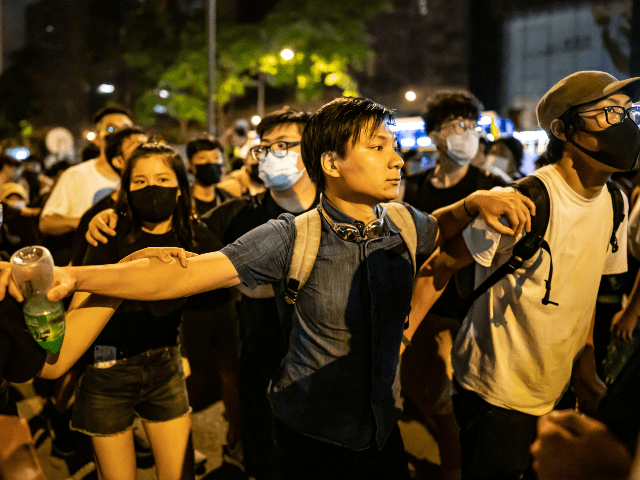A protest march on Sunday against Hong Kong’s controversial extradition bill drew hundreds of thousands of participants according to police, and over a million according to organizers, making it one of the largest public demonstrations since Hong Kong was returned to Chinese control in 1997.
Hong Kong chief executive Carrie Lam insisted on Monday the bill would move forward despite the incredible display of public resistance.
The South China Morning Post noted that if the organizers’ estimate of 1.03 million participants is accurate, the march put almost one in seven Hong Kong residents on the street. The official government estimate was about 240,000 during the peak hours of the rally on Sunday.
The protest march was disciplined and peaceful throughout the day, but at midnight on Sunday a smaller group of student radicals attempted to storm the legislature and clashed with police. The protesters used metal barricades as clubs and threw bottles at the police, who fought back with batons and pepper spray. Numerous injuries requiring hospital attention were reported.
Riot police regained control of the area around the Hong Kong legislative building within half an hour, but the protesters reorganized and occupied a road that saw battles between police and pro-democracy demonstrators during the 2014 Umbrella Movement. The police forcibly broke up the occupation by 2:00 a.m. and suggested the more violent late-night demonstrators could be charged with illegal assembly or carrying banned items.
Hong Kong Police Chief Stephen Lo Wai-chung denounced the after-midnight violence as “meaningless” and counterproductive to the cause of opposing the extradition bill. Lo said the police would deploy additional manpower to protect the legislature when hearings resume on Wednesday. Organizers said new demonstrations would be held at that time.
Critics of the extradition bill say it would fatally compromise Hong Kong’s autonomy, expose citizens and visitors to abuse by mainland China’s inhumane and politicized legal system, and damage Hong Kong financially by making foreign businessmen nervous about traveling to the city.
“For anyone with the right mind in any leadership after seeing this huge, massive turnout this afternoon, they should not just rethink the whole situation. They should scrap this very controversial bill and let Hong Kong have some breathing space,” opposition lawmaker Claudia Mo told Bloomberg News on Sunday.
“If this so-called bill passes, it will be more scary. Every Hong Kong citizen would think it’s a severe problem. What if I say something in my class and could be sent to China the next day?” Shue Yan University professor Wong Kin Yuen asked, expressing a fear held by many of the demonstrators.
“It might be futile, but we have to act and show the Hong Kong government, the international press, other Hong Kongers – that we won’t just roll over and let the Chinese government walk all over us,” one of the protesters told the BBC, which pessimistically noted street protests are the only real way Hong Kong citizens can express themselves politically because top public officials are appointed by a pro-Beijing panel rather than directly elected.
Various observers told the BBC protests are unlikely to stop the extradition bill because Beijing has become more domineering under Communist Party chief Xi Jinping and China’s economy has grown stronger, making it less worried about the economic fallout from heavy-handed actions taken in Hong Kong.
Hong Kong’s government insisted the bill would move forward despite the protests. The government maintained that protections in the bill are adequate, having been improved significantly after an earlier round of protests against the legislation.
“We urge the Legislative Council to scrutinize the bill in a calm, reasonable and respectful manner to help ensure Hong Kong remains a safe city for residents and business,” the government said in a statement.
After an evening of silence widely interpreted by political opponents as trepidation after the massive demonstration called for her resignation, chief executive Carrie Lam held a press conference on Monday in which she insisted the extradition law was not “initiated by the central people’s government” in Beijing, but instead represented a “commitment to the people of Hong Kong,” even if large numbers of them clearly do not see it that way.
Lam said the bill is necessary to facilitate the extradition of dangerous criminals. “Nobody wants Hong Kong to be a fugitive offender’s heaven,” she said.
Lam said the massive demonstration was proof the “rights and freedoms” of Hong Kongers are “as robust as ever.”
The mainland Chinese government scoffed at the demonstrators, describing them as dupes of “foreign forces” who are “seizing the opportunity to advance their own strategy to hurt China by trying to create havoc in Hong Kong,” as the state-run China Daily put it.
“Any fair-minded person would deem the amendment bill a legitimate, sensible and reasonable piece of legislation that would strengthen Hong Kong’s rule of law and deliver justice,” the Communist Party paper insisted.

COMMENTS
Please let us know if you're having issues with commenting.